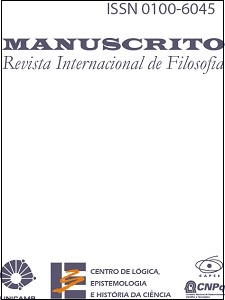Resumo
John McDowell and Bill Brewer famously defend the view that one can only have empirical beliefs if one’s perceptual experiences serve as reasons for such beliefs, where reasons are understood in terms of subject’s reasons. In this paper I show, first, that it is a consequence of the adoption of such a requirement for one to have empirical beliefs that children as old as 3 years of age have to considered as not having genuine empirical beliefs at all. But we have strong reasons to think that 3- year-old children have empirical beliefs, or so I argue. If this is the case, McDowell and Brewer’s requirement for one to have empirical beliefs faces a strong challenge. After showing this, I propose an alternative requirement for one to have empirical beliefs, and argue that it should be favoured over McDowell and Brewer’s requirement.
Resumo:
John McDowell e Bill Brewer famosamente defendem a visão de que um sujeito pode ter crenças empíricas apenas se as experiências perceptuais do sujeito servirem de razões para tais crenças, onde razões são entendidas em termos de razões do sujeito. Neste artigo, mostro, primeiro, que é uma consequência da adoção desse requerimento para que um sujeito possua crenças empíricas que crianças já em seus 3 anos de idade têm que ser consideradas como não possuindo crenças empíricas. Porém, como argumentarei, temos fortes razões para crer que crianças em seus 3 anos de idade possuem crenças empíricas. Nesse caso, o requerimento de McDowell e Brewer para a posse de crenças empíricas enfrenta um forte desafio. Após argumentar nesse sentido, proponho um requerimento alternativo para a posse de crenças empíricas, e defendo que tal requerimento deve ser favorecido em detrimento do requerimento apresentado por McDowell e Brewer.
Palavras chave: Crenças empíricas. Experiências perceptuais. Razões. John McDowell. Bill Brewer.
Referências
BONJOUR, L., SOSA, E. Epistemic Justification: Internalism vs. Externalism, Foundations vs. Virtues. Malden: Blackwell, 2003.
BRANDOM, R. “Perception and rational constraint”. Philosophy and Phenomenological Research, LVIII, pp. 369-374, 1998.
BREWER, B. Perception and Reason. Oxford: Oxford University Press, 1999.
CHEN, C.K. “Empirical content and rational constraint”. Inquiry, 49, pp. 242-264, 2006.
DANCY, J. “Acting in the light of the appearances”. In: C. Macdonald and G. Macdonald (eds.) (2006), pp. 121-133.
GOLDMAN, A. Epistemology and Cognition. Cambridge, Mass.: Harvard University Press, 1986.
GOPNIK, A., GRAF, P. “Knowing how you know: young children’s abilities to identify and remember the sources of their beliefs”. Child Development, 59, pp. 1366-1371, 1988.
GOPNIK, A., O’NEILL, D. “Young children’s abilities to identify the sources of their beliefs”. Developmental Psychology, 27, pp. 390-397, 1991.
MACDONALD, C., MACDONALD, G. (eds.). McDowell and his Critics. Oxford: Blackwell, 2006.
MCDOWELL, J. Mind and World. Cambridge, Mass.: Harvard University Press, 1994.
MCDOWELL, J “Reply to commentators”. Philosophy and Phenomenological Research, LVIII, pp. 403-431, 1998.
MCDOWELL, J. “Responses”. In: N.H. Smith (ed.) (2002), pp. 269-305.
MCDOWELL, J “Reply to Jonathan Dancy”. In C. Macdonald and G. Macdonald (eds.) (2006), pp. 134-141.
PINKER, S. The Language Instinct: The New Science of Language and Mind. London: Penguin, 1994.
PUTNAM, H. Reason, Truth and History. New York: Cambridge University Press, 1981.
SMITH, N.H. Reading McDowell: On Mind and World. London/ New York: Routledge, 2002.
WIMMER, H., HOGRAFE, J., PERNER, J. “Children’s understanding of informational access as a source of knowledge”. Child Development, 59, pp. 386-396, 1988.

